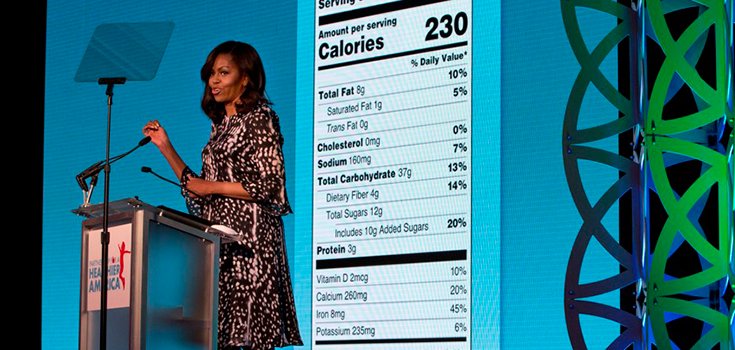Coming in July 2018: These Changes on Food Nutrition Labels

Over the next 2 years, you’re going to notice big changes in the nutrition labels that grace food packaging. One of the biggest changes – and perhaps the most important – will be the addition of added sugar.

And as you can imagine, that has the sugar industry really angry.
The FDA announced Friday that the U.S. will completely overhaul nutrition labels, and major food companies will have until July 2018 to make the required changes. Small businesses with less than $10 million in annual sales will have an additional year to comply. It will mark the first time the labels have undergone significant changes since they were introduced 2 decades ago. Approximately 800,000 products will be affected by the overhaul.
Under the new rules, companies will have to provide details about how much added sugar is in their products, including corn syrup, and white and brown sugar.
Read: Slashing Sugar Makes Kids Healthier In Just 10 Days
The updated labels will no longer list the amount of calories from fat, as research shows the type of fat is more important than the amount. For example, trans fat, the FDA ordered companies to phase out, is significantly “less healthy” than other forms of fat.
In the past, many individuals, as well as dietitians, have complained that the serving sizes listed on nutrition labels are unrealistic. In response, serving sizes will reflect what consumers consume, on average, affecting about 20% of all package labels. The FDA said that, in some cases, serving sizes will be adjusted upwards, such as ice cream, while other products, like yogurt, will be adjusted downwards.
The new serving sizes are somewhat shocking, but closer to what Americans actually consume, and that’s really the point. For example, a 20-ounce Coke will say it contains 65 grams of added sugar, or 130% of the recommended maximum. [1]
The FDA said:
“What and how much people eat and drink has changed since the last serving size requirements were published in 1993.” [2]
It certainly has. Americans can’t seem to get enough.

Additionally, the font-size of the calorie counts will be will be larger; serving sizes will be larger and in bolder type; daily values will be updated; nutrient amounts will be changed, with actual amounts declared; and there will be a new footnote at the bottom of the panels.
Health advocates are thrilled with the changes. They say the revised labels will help consumers make wiser food choices at a time when obesity and obesity-related illnesses are widespread and on the rise in the U.S.
American Heart Association CEO Nancy Brown said in a statement obtained by USA Today:
“We must do more to make every American aware of how many calories they eat daily.”
Jim O’Hara, director of health promotion policy at the Center for Science in the Public Interest, which has been pressuring the FDA to list added sugars on food labels since 1999, echoed Brown’s sentiment, saying:
“With the line for added sugars…this has the potential to really drive consumer behavior. As consumers change their behavior, that will prompt the industry to change its recipes, its product formulation.”
The changes were staunchly opposed by several major industry associations, including the American Bakers Association, American Beverage Association, American Frozen Foods Institute, Corn Refiners Association, International Dairy Foods Association and National Confectioners Association, and others. For 2 years, these groups fought to keep added sugars off of food panels, but to no avail.
The food and beverage industry insist that added sugar – honey, corn syrup, fruit juice concentrate, and other sweeteners – and naturally occurring sugar have the same effect on weight gain.
To try and stop the addition of added sugars to the labels, the sugar industry argued that having a line that says “sugars,” and another that says “added sugars” would only confuse shoppers, since it wouldn’t clarify that “added sugars” is part of “sugars.” To tackle the problem, the FDA changed “sugars” to “total sugars,” and added “includes” to the “added sugars” line.
Even so, the sugar industry said the health watchdog was demonizing sugar, even seemingly minuscule amounts.
Mortality Rate Doubles: Study Shows That Even “Safe” Levels Of Sugar Aren’t Safe
In a statement to IOL, The Sugar Association said:
“The Sugar Association is disappointed by the Food and Drug Administration’s (FDA) ruling to require an ‘added sugars’ declaration and daily reference value (DRV) on the Nutrition Facts Label (NFL). The extraordinary contradictions and irregularities, as well as the lack of scientific justification in this rulemaking process are unprecedented for the FDA.”
But not all companies are resisting the changes. Some, in fact, started embracing them some time ago. For more than a decade, General Mills has been reducing sugar in products marketed towards children, including yogurt and cereal. Both Mars and Nestle support the measure, and The Hershey Company, the nation’s largest chocolate maker, said it “will work diligently to make the necessary updates to our Nutrition Facts labels as requested by the FDA.”
In the U.S., heart disease, type 2 diabetes, certain types of cancer, and other obesity-related diseases are some of the leading causes of preventable death. Hopefully the new labels will be eye-opening enough to convince people to make better food choices.
Sources:
[2] Reuters

Changes I am glad to see!